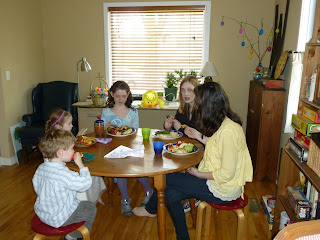During most of the year, our church rotates between an "informal" and "formal" schedule. On formal Sundays we have a more "typical" worship experience with singing, communion and preaching. On informal Sundays we typically have more of a teaching lesson separate from the worship service (but still biblically based lest you worry about that), and our worship service we call "Jam & Bread" (as we just have singing and communion--along with the normal Psalm reading, confession, scripture reading and other liturgical elements).
Our informal Sundays this fall are focused on a "Re-Root" theme. Our church is five years old and we're taking time to remember (and teach some of the newer members) about our new monastic roots. Each informal Sunday there will be a lecture, a dialogue and an experience to choose from. The lecture was on "The Rule of Benedict," the dialogue was about "What it Means to Be a New Monastic" and the experience was on"Lectio Divina." My friend Pete was supposed to lead the Lectio Divina, but as he is homebound now in a wheel chair--at least for a few days of getting used to things--I lead the experience for him.
I'm knowledgable in Lectio Divina and have led some exercises on it before, but as with many spiritual practices, I'm more knowledgeable than I am experienced. But that's why they're called spiritual
practices. They take time, coming back and doing them again and again, in order to provide space for encountering God.
Lectio Divina (meaning "Divine Reading") is an ancient form of praying the scriptures in a way that you encounter God and hear His voice (for more information, here is our church's information on
Lectio Divina). It was a privilege to lead a group through tonight's Scripture reading and see the different ways God speaks to people through the same passage. And in that, hearing God speak to me as well.

In searching for a resource our denomination used to have for Lectio Divina, I came across someone's blog bashing our denomination for using Lection Divina (not that most of those within the denomination necessarily use it, but our Department of Christian Formation at one point had resources for it). The person was warning against the use of Lectio Divina because when you do the method, your repeat a specific text four or five times, typically. Apparently to him, the repition of Scripture violates Jesus' commandment: "But when ye pray, use not vain repetitions, as the heathen do: for they think that they shall be heard for their much speaking. (Matthew 6:7--I quote the King James Version as the writer of the blog did). First, I don't think reading or saying Scripture aloud more than once is "a vain repetition." Second, I don't think the "heathens" would repeat any portion of scripture anyway. Third, we don't repeat scripture in Lectio Divina to be heard by God, but rather to create space for us to hear Him.
The author was also anti-Lectio Divina because it is a "Catholic" practice. Of course, the practice predates the reformation to a time when there was only one church--albeit a "catholic" one in the "universal" sense of the word. While St. Benedict is often credited as the founder of Lectio Divina, it is well-rooted in ancient Hebrew practices of repeating and meditating on the Torah.
Too often I come across people who shun some practice of the church today because it is "pagan," "Catholic," or "unbiblical." I have heard people say practices such as lighting candles, using prayer labyrinths, playing instruments other than an organ or piano have no place in the church because they aren't mentioned in the Bible. And they may not be. But plenty isn't mentioned in the Bible that is still acceptable to these same people: sitting in pews, listening to sermons, singing anything that's not a Psalm, wearing suits and ties and Sunday dresses aren't mentioned in the Bible. But many of us cling to those actions.
Sometimes we are fearful of things we don't understand. Too often we have biases against practices our faith doesn't normally do (especially if we're "Protestant" and the practice might be "Catholic"). We don't understand that things like Lectio Divina have been used by faithful followers for well over 1500 years (in many cases two - three thousand years or more when rooted in the Jewish traditions). Too often we get tied in our own modern traditions while ignoring spiritual practices that have been around for millennia.
But we do these spiritual practices not to be "religious" or "spiritual" but to slow down and take the time to be with God, acknowledging that we desire to create space to encounter God. The ancient Hebrews knew this; the early Christians knew this. Too often we think we know better than they did. We have much to learn (for more information on these ancient practices look for the
Ancient Practices series that Phyllis Tickle spearheaded).






